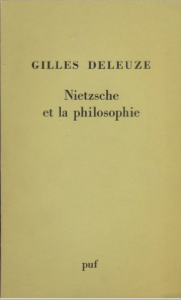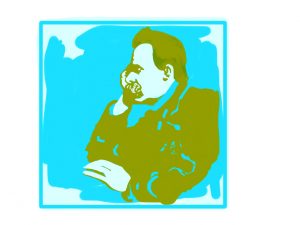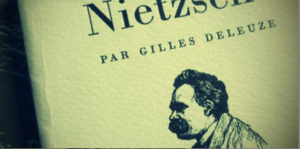By Bernard E. Harcourt
If Georges Bataille recuperated Nietzsche from the fascists and made war reparations to him, returning to Nietzsche an untainted concept of the will to power; and if Maurice Blanchot elevated Nietzsche’s aphoristic style, gave pride of place to his writing, and returned to Nietzsche the radical, even revolutionary potential of the very act of writing—while other philosophers, such as Jean Wahl and Pierre Klossowski, reinstated Nietzsche into post-War philosophical discourse—then Gilles Deleuze, we could say, turned Nietzsche into a critical philosopher.
In Deleuze’s hands, Nietzsche becomes the founder, the inventor of “une philosophie critique,” (Nietzsche et la philosophie, p. 97 and p. 2; hereafter N&P-F): Nietzsche displaces Kant—whom we conventionally considered the source of critique, but who, Deleuze tells us, missed the target and did not do “real critique”—, Nietzsche dethrones Kant to become the critical theorist.
Deleuze locates in Nietzsche the pure form of “critique,” the essence of critique, the core of critique: namely, the questioning of the value of values. Nietzsche alone raised the question of the value of morality. Deleuze declares:
« la philosophie des valeurs, telle qu’il [Nietzsche] l’instaure et le conçoit, est la vraie réalisation de la critique, la seule manière de réaliser la critique totale, c’est-à-dire de faire de la philosophie à ‘coups de marteau’ ». (N&P-F, p. 1).
The critical element, Deleuze writes—italicizing the word “critique,” “l’élément critique”—is precisely “the creative element of meaning and of values.” (N&P-F, p. 97) And so the problem of critique, “le problème critique,” Deleuze defines specifically as “la valeur des valeurs, l’évaluation dont procède leur valeur, donc le problème de leur création.” (N&P-F, p. 1)
 It is 1962 when Deleuze publishes his monograph Nietzsche et la philosophie with the Presses universitaires de France. He would write monographs on others, Spinoza and famously Foucault. But now it was time for Nietzsche—to whom he would return again and again: in 1964, in an influential essay in les Cahiers de Royaumont, VIIe Colloque, 4-8 juillet 1964 (Les Editions de minuit, 1967); in 1965, in a shorter monograph, a précis, titled, simply, Nietzsche; and in several other articles and essays. Deleuze’s nietzschean turn in the early 1960s would deeply influence all of his subsequent writings—one can almost say that it was determinative, altering. Deleuze would draw on the nietzschean concepts that he refined in Nietzsche et la philosophie as a basis, a springboard, or perhaps a trampoline to propel himself to the heights of, first, Difference and Repetition in 1968, and then, with Félix Guattari, Anti-Oedipus in 1972 and A Thousand Plateaus in 1980. One cannot think Deleuze without Nietzsche.
It is 1962 when Deleuze publishes his monograph Nietzsche et la philosophie with the Presses universitaires de France. He would write monographs on others, Spinoza and famously Foucault. But now it was time for Nietzsche—to whom he would return again and again: in 1964, in an influential essay in les Cahiers de Royaumont, VIIe Colloque, 4-8 juillet 1964 (Les Editions de minuit, 1967); in 1965, in a shorter monograph, a précis, titled, simply, Nietzsche; and in several other articles and essays. Deleuze’s nietzschean turn in the early 1960s would deeply influence all of his subsequent writings—one can almost say that it was determinative, altering. Deleuze would draw on the nietzschean concepts that he refined in Nietzsche et la philosophie as a basis, a springboard, or perhaps a trampoline to propel himself to the heights of, first, Difference and Repetition in 1968, and then, with Félix Guattari, Anti-Oedipus in 1972 and A Thousand Plateaus in 1980. One cannot think Deleuze without Nietzsche.
On Deleuze’s reading, Nietzsche’s overarching project was “to introduce the notions of meaning and value into philosophy.” (N&P-F, p. 1). In this sense, Deleuze wrote, Nietzsche shaped modern philosophy, although modern philosophy would not always stay true to Nietzsche. Nietzsche reoriented modern philosophy away from straightforward questions of truth and falsity, toward the categories of good and evil:
« Une nouvelle image de la pensée signifie d’abord ceci : le vrai n’est pas l’élément de la pensée. L’élément de la pensée est le sens et la valeur. Les catégories de la pensée ne sont pas le vrai et le faux, mais le noble et le vil, le haut et le bas, d’après la nature des forces qui s’emparent de la pensée elle-même. » (N&P-F, p. 119)
By posing the question in terms of values, rather than truth or falsity or the limits of reason, Nietzsche founded a genuine critical philosophy: one that questions the values of values, that raises the question of the creation of values and of the meaning of evaluation, thus performing a reversal that is critique (“un renversement critique” N&P-F, p. 1). The key to this reversal is the following:
« Voilà l’essentiel : le haut et le bas, le noble et le vil ne sont pas des valeurs, mais représentent l’élément différentiel dont dérive la valeur des valeurs elles-mêmes. » (N&P-F, p. 2).
On Deleuze’s reading, Kant never got close to doing this and, as a result, never fully grasped the idea of critique. (N&P-F, p. 100) Kant never engaged in “true critique” (“la vraie critique”), Deleuze maintained, because Kant “did not know how to pose the problem of critique in terms of values.” (N&P-F, p. 1). Although Kant set as his goal an immanent critique—an internal critique of reason by reason—this, Deleuze writes, is an impossible “contradiction” (N&P-F, p. 104); one that Nietzsche would overcome through his notion of the will to power which alone is able “to make possible the transmutation” (N&P-F, p. 104). Thus, Deleuze writes: « L’instance critique est la volonté de puissance, le point de vue critique est celui de la volonté de puissance. » (N&P-F, p. 107).
This critical approach falls under the rubric of “genealogy,” and the philosopher himself becomes a genealogist (N&P-F, p. 107). Genealogy captures the critical element insofar as it challenges the value of values by seeking the origin of values. In this, it comprises a double movement: the origin of the values and the value of the origins. It should come as little surprise that Deleuze’s Nietzsche et la philosophie begins under the header “le concept de généalogie” on the very first page.
At the heart of genealogy, there is a certain distantiation, or distance, or difference. « Au principe de l’universalité kantienne, comme au principe de la ressemblance cher aux utilitaristes, Nietzsche substitue le sentiment de différence ou de distance (élément différentiel). » (N&P-F, p. 2). This notion of difference reflects the genealogical distance from the origin: the search both for origins, but also for the distance from origins. These would be core terms that Deleuze would continue to explore and develop—and appropriate in his work, a few years later, on Différence et répétition.
At its most radical, critique challenges the value of truth: returning to the Genealogy of Morals and the passage in essay three, §24: “Let us thus define our task—we must attempt once and for all to put in question the value of truth.” (N&P-F, p. 108). This ties directly to Nietzsche’s abyss and the moral basis of the desire for truth.
***
At the same time, Deleuze systematized Nietzsche as a thinker, presenting his main ideas in a rigorous, interconnected, and coherent manner. Deleuze tried to fix the terminology, to anchor the metaphors, to refine the logic and argument. It was necessary, Deleuze maintained, because “all the rigor of this philosophy, of which we often suspect, to our detriment, the systematic precision,” depended on this type of analytic work (N&P-F, p. 59) Deleuze paid special attention to Nietzsche’s later work, from 1887, The Genealogy of Morals—more so than many before him, such as Georges Bataille or Maurice Blanchot—in large part because, for Deleuze, The Genealogy represents the most systematic of his books, and it grounds his critical philosophy.
The Deleuzian Nietzsche is, then, a very unique Nietzsche, uncompromised. A Nietzsche that is totally at odds with Kant. At odds with Hegel as well. An anti-dialectic Nietzsche. An anti-Hegelian Nietzsche. « Il n’est pas de compromis possible entre Hegel et Nietzsche. La philosophie de Nietzsche […] forme une anti-dialectique absolue, se propose de dénoncer toutes les mystifications qui trouvent dans la dialectique un dernier refuge. » (N&P-F, p. 223).
And thus, Deleuze, like Bataille, made reparations to Nietzsche. Four especially, as he himself would tell us:
First, concerning the will to power: it is crutial, Deleuze maintained, to avoid interpreting the will to power as “wanting to dominate” or “wanting power.” (N&P-F, p. 90-96; N-E p. 92) Here, we hear clear resonance with Bataille who, as you will recall, directly argued that the will to power is antithetical to the fascist will to dominate. In Deleuze’s hand, the will to power is turned inside out (N&P-F, p. 59 et seq.; p. 96): « la puissance est ce qui veut dans la volonté » (N&P-F, p. 96). “Power, as a will to power, is not that which the will wants, but that which wants in the will (Dionysus himself).” (N-E p. 73) Deleuze adds, “The will to power is the differential element from which derive the force at work, as well as their respective quality in a complex whole.” (N-E p. 73)
Second, concerning strength and weakness: it is equally important, Deleuze maintained, to avoid “believing that the most powerful in a social regime are thereby the strong” (N-E p. 92). Deleuze worked hard to better understand and better explain Nietzsche’s conception of strength. As he wrote, “the weak, the slaves, triumph not by adding up their forces but by subtracting those of the other: they separate the strong from what they can do. They triumph not because of the composition of their power but because of the power of their contagion.” (N-E p. 75).
Third, concerning the eternal return: it is crucial, Deleuze emphasized, to avoid interpreting the eternal return as “an old idea, borrowed from the Greeks, the Hindus, the Babylonians,” or that it is “a cycle, or a return of the same, a return to the same” (N-E p. 92) Deleuze reads it as I do: as confirming becoming over being; or as I would say, as a moral hypothetical that underscores the exigency of judgment and decision. In Nietzsche et la philosophie, Deleuze develops the ethical reading of the eternal return in the clearest terms: the eternal return is the equivalent of a Kantian maxim that helps guide our actions. Rather than the categorical imperative, it is the threat of recurrence: act so that you would be willing to always have your action recur. Deleuze in fact states that « L’éternel retour donne à la volonté une règle aussi rigoureuse que la règle kantienne. » (N&P-F, p. 77). « Comme pensée éthique, l’éternel retour est la nouvelle formulation de la synthèse pratique : Ce que tu veux, veuille-le de telle manière que tu en veuilles aussi l’éternel retour. »[i] (N&P-F, p. 77 ; N&P-E, p. 68). Deleuze finds and rehearses the specific passage from The Will to Power, IV, §242: “If, in all that you will you begin by asking yourself: is it certain that I will to do it an infinite number of times? This should be your most solid center of gravity.”[ii] (N&P-E, p. 68) And he adds later, to confirm and emphasize, « L’éternel retour est l’être du devenir. » (N&P-F, p. 81).
And fourth, to rescue the last works of Nietzsche from his later madness and include them in our reconstruction of his thought.
In the end, central themes emerge: chance, multiplicities, becoming. These are important themes for Nietzsche, on Deleuze’s writings, some in common with Bataille, who as you will recall subtitled his On Nietzsche, “the will to chance.” The dice, the random, chance recurs in Deleuze’s Nietzsche. See N&P-F, p. 29, 36; also at 225.
To help us read Deleuze’s Nietzsche, we are delighted to welcome Barbara Stiegler, John Rajchman, and Michael Taussig.
Welcome to Nietzsche 4/13!
« Que le multiple, le devenir, le hasard soient objet d’affirmation pure, tel est le sens de la philosophie de Nietzsche. » (N&P-F, p. 225)
NOTES
[i] “The eternal return gives the will a rule as rigorous as the Kantian one. […] As an ethical thought the eternal return is the new formulation of the practical synthesis: whatever you will, will it in such a way that you also will its eternal return.” (N&P-E, p. 68).
[ii] « Si, dans tout ce que tu veux faire, tu commences par te demander : est-il sur que je veuille le faire un nombre infini de fois, ce sera pour toi le centre de gravité le plus solide. » (N&P-F, p. 77)


